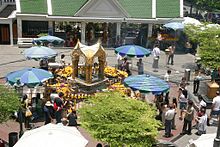Buddha statue in Kuala
Terengganu temple
vandalised
The case is being investigated under Section 295 of the Penal Code for causing damage to a place of worship.

Kuala Terengganu police chief Azli Noor confirmed the incident, stating that a worker at the Choo Men Thong temple discovered the four-faced Buddha statue on the floor with shattered glass around it at 7.15am.
The temple’s chairman filed a police report following the discovery.
The case is being investigated under Section 295 of the Penal Code for causing damage to a place of worship, which carries a maximum prison sentence of two years, a fine, or both, if convicted.
said Azli.The statue was not damaged but was pushed to the floor by an unknown individual,
“The temple is not guarded at night, does not have CCTV surveillance, and is not gated.
There are visitors who visit the temple to pray for 4D lottery numbers, and based on our preliminary investigation, there is a possibility that the act was committed by a frustrated punter.
Azli also noted that this was the first time the temple had been vandalised since it was built.
The 20kg copper statue is valued at RM2,500, with Azli saying the temple’s chairman estimated the cost of the damage to the temple to be around RM550.
Azli stressed that the case was not related to issues concerning race or religion.
***
kt comments:
Four-faced Buddha statue is probably that of Lord Brahma, a Hindu deity. Thai buddhists also worship Hindu gods. One of the most famous shrine in the heart of Bangkok city, Erawan Shrine, is that of Lord Brahma.

Wikipedia informs us (extracts only):
The Erawan Shrine, formally the Thao Maha Phrom Shrine (Thai: ศาลท้าวมหาพรหม; RTGS: San Thao Maha Phrom; 'shrine of Lord Maha Brahma'), is a shrine in Bangkok, Thailand, which houses a statue of Phra Phrom, the Thai representation of Brahma, the Hindu god of creation. The name also refers to Mahabrahma, the ruler of the Brahma realm in Buddhist cosmology.
The deity is popularly worshipped outside of a Hindu religious context, but more as a representation of guardian spirits in Thai animist beliefs, nevertheless the shrine shows an example of syncretism between Hinduism and Buddhism.[1][2] The shrine often features performances by Thai dance troupes who are hired by worshippers in return for seeing their prayers answered at the shrine.
Location
[edit]
The shrine is near the Grand Hyatt Erawan Bangkok, at the Ratchaprasong intersection of Ratchadamri Road in Lumphini Subdistrict, Pathum Wan District. It is near the BTS Skytrain's Chit Lom Station, which has an elevated walkway overlooking the shrine. The area has many shopping malls nearby, including Gaysorn, CentralWorld, and Amarin Plaza.
Five other shrines dedicated to Hindu deities are located in the area as well: Phra Laksami (Lakshmi), Phra Trimurati (Trimurti), Phra Khanet (Ganesha), Phra In (Indra), and Phra Narai Song Suban (Narayana on his garuda).[3][4][5]
History
[edit]
The Erawan Shrine was built in 1956 as part of the government-owned Erawan Hotel to eliminate the bad karma believed caused by laying the foundations on the wrong date.
The hotel's construction was delayed by a series of mishaps, including cost overruns, injuries to laborers, and the loss of a shipload of Italian marble intended for the building. Furthermore, the Ratchaprasong intersection had once been used to put criminals on public display.
An astrologer advised building the shrine to counter the negative influences. The Brahma statue was designed and built by the Department of Fine Arts and enshrined on 9 November 1956. The hotel's construction thereafter proceeded without further incident.[6] In 1987, the hotel was demolished and the site used for the Grand Hyatt Erawan Hotel.[7]
2006 vandalism
[edit]In the early hours of 21 March 2006, a young man named Thanakorn Pakdeepol destroyed the statue with a large hammer. He was then beaten to death by angry bystanders. Two street sweepers were arrested and charged with the murder.[8][9] Witnesses said Thanakorn stood on the base of the statue and smashed the hollow statue of Brahma to pieces, fragmenting the four-faced head, torso, six arms, and weapons. Only part of the lap and the base of the statue remained intact.[10]
Among Ilsamist Fundamentalist extremists, what they consider idolatry - worshipping idols - is one of the worst offences.
ReplyDeleteIt just grates on them. That's why they relish with which they carry out temple demolitions.
In fact, most Buddhist see the figures as a focus of respect and mindful prayer, not worshipping the figure itself.